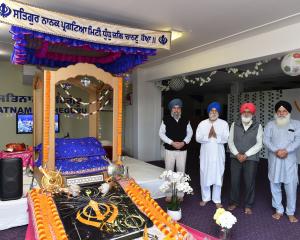Harbour Cycle Network co-ordinator Steve Walker said members were "overjoyed'' to hear funding had been approved for the project.
"This is fantastic news. Our group has lobbied hard for this and the resulting path extension will continue what is becoming a wonderful amenity for West Harbour and Dunedin residents.''
The walkway-cycleway will continue from where the first stage finished, just past the Ravensbourne Yacht Club, and run parallel with the railway line to Jessie St, in Maia.
Transit New Zealand regional projects manager Simon Underwood said funding for the project, estimated to cost between $300,000 and $350,000, would be coming from a national $3 million pool of funds set aside for cycle and walkway projects.
Advertising for the tender process was under way and it was hoped work would begin in late May and be completed by September, Mr Underwood said.
The first stage of the project would involve building a fence alongside the railway, which would then allow construction work to continue safely.
The cycleway was being built on land owned by Ontrack and without its support the project would not have gone ahead, he said.
There was enough space to construct the 3m wide cycleway alongside the railway tracks, apart from a couple of "pinch points'' where the cycleway would be narrowed to 2m.
A consent issue with the historic sea wall should be resolved during the tendering process, Mr Underwood said.
Investigations to continue the cycleway to Port Chalmers were continuing, Mr Underwood said.
Previous reports have estimated building a further 8.4km of track from Ravensbourne to Port Chalmers would cost more than $3 million.
"We are starting at the city end and working our way out.''
Mr Walker said the existing stretch of habourside cycleway-walkway had become "extremely well used'' by walkers and cyclists.
"Even when pushing to get it built, I wasn't aware how much it would be used by walkers.''
A Transit survey conducted last November showed on average the existing walkway-cycleway was used more than 500 times per day by cyclists and walkers.
The first 1.2km section of the cycleway, which starts at the end of Magnet St, near the Otago University Rowing Club, cost $220,000 and was completed in 2006.
It was funded by various organisations, including the Otago Regional Council, the Dunedin City Council, Port Otago and Transit New Zealand.












